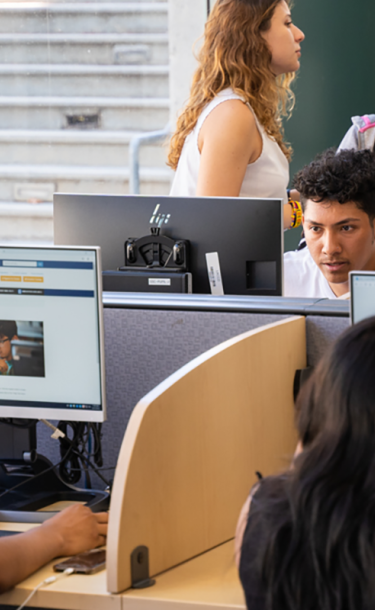About Computer Programming
The Associate of Science Degree in Computer Programming provides a student with the necessary skills to become a programmer. The program consists of core courses, programming languages, and computer science transfer courses. Graduates can program business applications, and web applications, and participate as a member of a project team that builds systems. This is to best qualify our students for positions in industry and provide for their future growth.
Program Learning Outcomes:
-
Graduates will have an e-Portfolio with examples of business applications using professional database tools and current programming languages.
-
Graduates will have an e-Portfolio with examples of web and mobile applications.
Programs
SKILL CERTIFICATE Programming (M070100J)
Prerequisite: None
Lecture: 2 hrs, Lab: 2 hrs
Analytics and data-mining using Excel spreadsheets and Access databases. The course includes: using databases, spreadsheets, and other systems to gather information, research, analyze, and interpret complex data, loan amortization schedules, automatic update of spreadsheets with data downloaded from other sources, database management and reporting, and automating processes with VBA. Recommended for Business Majors.
Prerequisite: None
Lecture: 2 hrs, Lab: 2 hrs
A beginning course where students will create web pages, set up personal or commercial web sites, upload to a web server that the class creates and use HTML as a foundation to JavaScript.
Prerequisite: None.
Advisories: CO SCI 430 or CIS 124
Lecture: 2 hrs, Lab: 2 hrs
The student learns the concepts of both relational and object relational databases and the SQL language. Data server technology, creating and maintaining database objects, as well as storing, retrieving and manipulating data are also covered.
Prerequisite: None
Lecture: 3 hrs, Lab: 1 hr
Describes computer development, uses of the computer by business management, the use of major workplace applications programs, operating systems and programming. Students will analyze, design and construct technology solutions for organizations.
CERTIFICATE OF ACHIEVEMENT Computer Programmer (M036321D)
Includes CS 101, CIS 148, and the ones below
Prerequisite: None
Advisory: CO SCI 450
Lecture: 2 hrs, Lab: 2 hrs
Introduces JavaScript to Web developers with HTML and CSS background who want to create dynamic Web pages and to Server-side programmers who use languages like ASP, JSP, or PHP and would like to add JavaScript programming to their skill sets. Students integrate script elements, outputting to a web document, working with selections, repetition structures, writing functions; and accessibility to create dynamic web applications
Advisories: CO SCI 407 or CS 102
Lecture: 2 hrs, Lab: 2 hrs
CS-113: Covers Java language and object-oriented programming paradigm. Topics include control structures, methods, Java classes, overloading, object references, Java library packages, and file I/O.
Prerequisite: None
Lecture: 2 hrs, Lab: 2 hrs
CS-116: This course introduces the discipline of computer science using a high-level programming language such as C++ and utilizing programming and practical hands-on problem solving. Students learn the fundamental concepts of programming by applying lecture content to practical hands-on problem solving laboratory activities. Students design, implement, test, and debug computer programs using top-down, structured programming techniques. Students examine program planning techniques, expressions, selection, repetition, arrays, data structures, functions, parameter passing, and file and interactive input/output. Intended as a first course in computer science. This course is required for computer information systems and computer science majors; and is desirable for students wishing to study programming.
Prerequisite: None
Lecture: 2 hrs, Lab: 2 hrs
Students will learn topics of the Python language such as data types, variables, control structures, Python Objects, standard and advanced mathematical libraries, tool-chain use and Python Frameworks, user-defined classes and abstract collections, single and multidimensional arrays, Python lists, tuples, collections, and dictionaries.
Prerequisite: CO SCI 439 or CS 113 or CS 116
Lecture: 2 hrs, Lab: 2 hrs
CS-213: Covers Java language and object-oriented programming paradigm. Topics include control structures, methods, Java classes, overloading, object references, inheritance, polymorphism, Java library packages, exception handling, file I/O (Input/ Output) and recursion. Introduces data structures such as arrays, lists and stacks.
Prerequisite: CO SCI 439 or CS 113 or CS 114 or CS 116
Lecture: 2 hrs, Lab: 2 hrs
CS-216: Covers C++ language and object-oriented programming paradigm. Fundamental programming topics include control structures, functions, arrays, pointers, strings, input and output, recursion, and file processing. Object-oriented programming and advance topics include classes, operator overloading, inheritance, virtual functions, polymorphism, templates, and exception handling. Introduces to data structures such as stacks, queues, and trees in C++ object oriented programming.
ASSOCIATE IN SCIENCE (AS) Computer Programmer (M036322C)
Includes ALL of the courses above and those listed below.
Prerequisite: CO SCI 407 or CS 102
Advisory: CS 113 or CS 216
Lecture: 2 hrs, Lab: 2 hrs
Covers organization and operation of real computer systems at the assembly-language level. Studies mapping statements and constructs in a high-level language onto sequences of machine instructions as well as the internal representations of simple data types and structures. Investigates basic principles of operating systems and programming language translation process.
Prerequisite: CO SCI 440 or CO SCI 452 or CS 213 or CS 216
Lecture: 2 hrs, Lab: 2 hrs
Covers abstract data types including a deeper understanding of object-oriented programming concepts. Students will learn how to analyze running times of algorithms using analysis tools. Implements linear data structures including stacks, queues, and hash tables. Implement and utilize binary search trees to solve problems.
Note:
A minimum of 60 units and a cumulative GPA of 2.0 or higher must be completed to earn the Associate Degree. Major courses must each be completed with a grade of C or better. Always consult a counselor for information on program and graduation requirements, residency requirements, and transfer information.
Contact Us
Office Hours and Location
Lab Hours: 8:00 - 4:00 / Monday-Friday
Location: INST 2009
